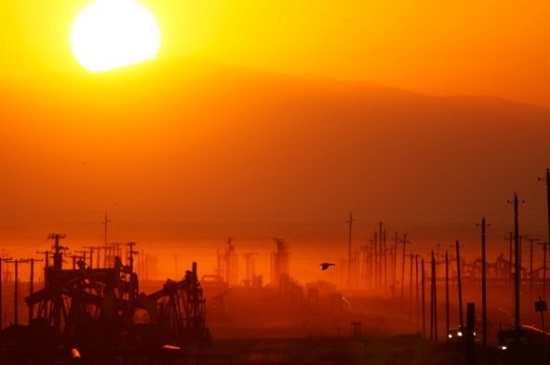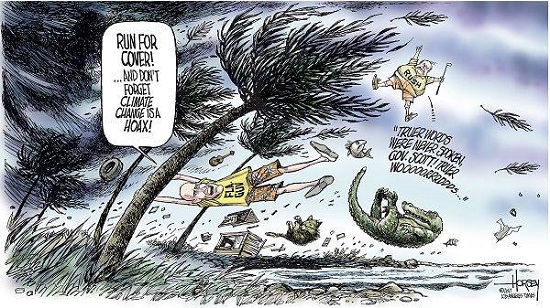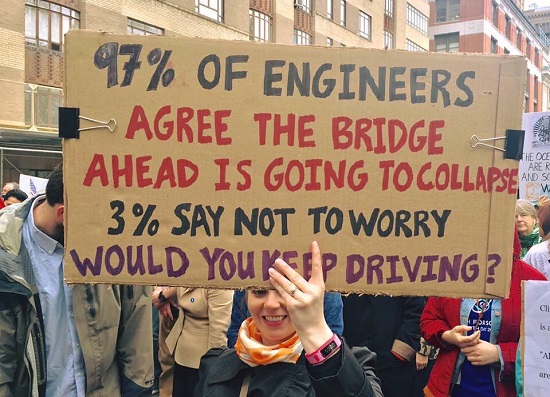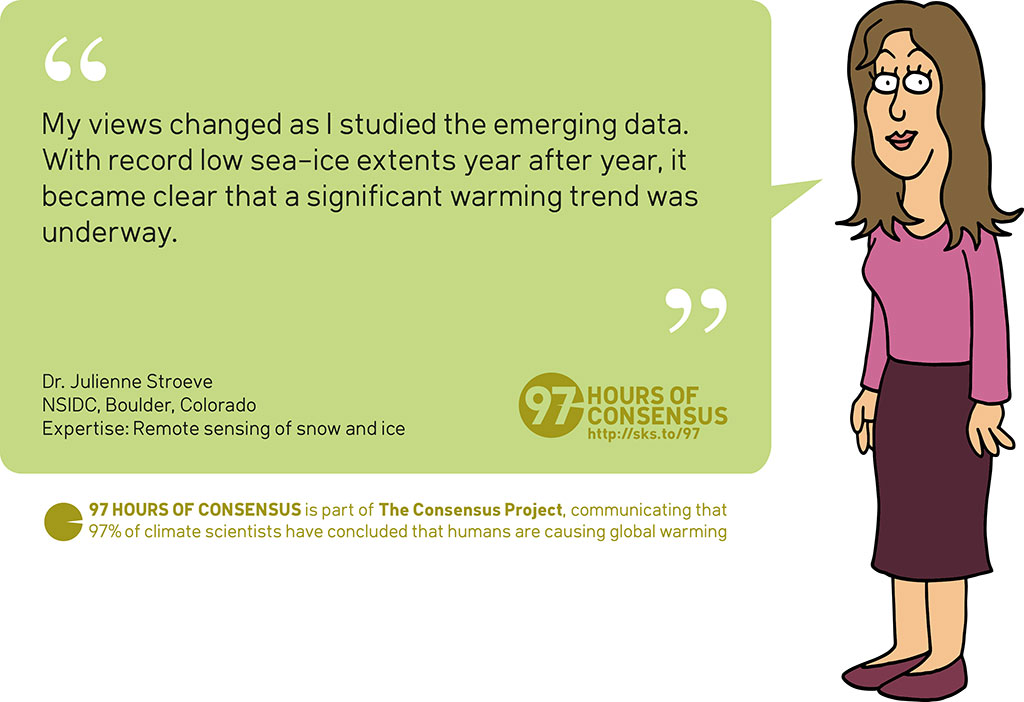2017 SkS Weekly Climate Change & Global Warming Digest #37
Posted on 17 September 2017 by John Hartz
Story of the Week... El Niño/La Niña Update... Toon of the Week... Quote of the Week... SkS in the News... Coming Soon on SkS... Poster of the Week... Climate Feedback Reviews... SkS Week in Review... 97 Hours of Consensus...
Story of the Week...
The Window Is Closing to Avoid Dangerous Global Warming

Credit: David McNew Getty Images
Deadly climate change could threaten most of the world's human population by the end of this century without efforts well beyond those captured in the Paris Agreement.
That's the finding of a pair of related reports released yesterday by an international group of climate science and policy luminaries who warned that the window is closing to avert dangerous warming. They say carbon dioxide might have to be removed from the atmosphere.
Scientists Yangyang Xu and Veerabhadran Ramanathan found in a paper published in the Proceedings of the National Academy of Sciences (PNAS) that there already exists a 1 in 20 chance that the 2.2 trillion tons of carbon dioxide in the Earth's atmosphere could cause an existential warming threat. This "fat tail" scenario would mean the world experiences "existential/unknown" warming by 2100 — defined in the report as more than 5 degrees Celsius above preindustrial levels.
The Window Is Closing to Avoid Dangerous Global Warming by Jean Chemnick, ClimateWire/Scientific American, Sep 15, 2017
El Niño/La Niña Update
La Niña is now increasingly possible in the next few months, according to a new reportreleased by NOAA, and may have some impacts on weather in the United States in the fall and winter.
La Niña May Develop By Fall or Winter, NOAA Says; Here's What That Could Mean by Jonathan Erdman, Sep 13, 2017
Toon of the Week...

Quote of the Week...
That is one reason many scientists maintain it is critical to use the megaphone that the dual devastation of Hurricane Harvey and Hurricane Irma has provided. People, they note, are finally paying attention.
“We know that as humans, we are all too good at pretending like a risk, even one we know is real, doesn’t matter to us,” Katharine Hayhoe, an atmospheric scientist at Texas Tech University, wrote in an email as Harvey lashed the Texas coast.
“When we try to warn people about the risks, there’s no ‘news’ hook. No one wants to listen. That’s why the time to talk about it is now,” Dr. Hayhoe said. “The most pernicious and dangerous myth we’ve bought into when it comes to climate change is not the myth that it isn’t real or humans aren’t responsible. It’s the myth that it doesn’t matter to me. And that is exactly the myth that Harvey shatters.”
Hurricane Irma Linked to Climate Change? For Some, a Very ‘Insensitive’ Question. by Lisa Friedman, Climate, New York Times, Sep 11, 2017
SkS in the News...
In her Washington Post Right Turn Op-ed, Will Harvey and Irma be a wake-up call?, Jennifer Rubin wrote:
And yet Republicans from Texas (both U.S. senators and a slew of congressmen), Florida (most especially Gov. Rick Scott and Sen. Marco Rubio), Alabama and Louisiana, among other locales, refuse to acknowledge the clear cause of rising sea levels and temperatures that add to the destructiveness of hurricanes that devastate their states. The GOP pols like to dodge the question by saying they are not climate scientists — and then refuse to accept the findings of 97 percent of the scientific community. Bluntly put, they’d rather cling to their know-nothingism than take steps to abate a known danger to their states. How is that any different from refusing to build levees and pumps or update building standards? (Of course, the climate-change denier in chief did cancel a flood regulation that took account of global warming, something he should be asked about when he goes for his next photo op.)
Coming Soon on SkS...
- Scientific models saved lives from Harvey and Irma. They can from climate change too (Dana)
- Australia's Transition to Renewable Energy (Agnostic)
- New research, September 4-10, 2017 (Ari Jokimäki)
- Guest Post (John Abraham)
- Why the 97% climate consensus is important (Dana, John Cook, Sander van der Linden, Ed Maibach, Tony Lieserowitz)
- 2017 SkS Weekly Climate Change & Global Warming News Roundup #38 (John Hartz)
- 2017 SkS Weekly Climate Change & Global Waming Digest #38 (John Hartz)
Poster of the Week...

Climate Feedback Reviews...
Climate Feedback asked its network of scientists to review the article, Has Climate Change Intensified 2017’s Western Wildfires? by Robinson Meyer, The Atlantic, Sep 7, 2017.
Three scientists analyzed the article and estimate its overall scientific credibility to be ‘very high’.
A majority of reviewers tagged the article as: Accurate, Insightful, Sound reasoning
Review Summary
This story in The Atlantic describes the conditions that have contributed to this year’s widespread wildfires in the western United States, including the influence of a changing climate.
Scientists who reviewed the story found that it was an accurate summary of the factors involved in this fire season—warm temperatures as well as past fire-suppression practices that have increased the density of fuel available for fires to burn.
SkS Week in Review...
- 2017 SkS Weekly Climate Change & Global Warming News Roundup #37 by John Hartz
- New research, September 4-10, 2017 by Ari Jokimäki
- Global weirding with Katharine Hayhoe: Natural Cycles, Video by KTTZ Texas Tech Public Media
- Video: The Path Post-Paris by Peter Sinclair (Climste Denial Crock of the Week)
- Trump promised to hire the best people. He keeps hiring the worst. Nasa is next by Dana Nucitelli (Climate Consensus - the 97%, Guardian)
- New research, August 28 - September 3, 2017 by Ari Jokimäki
- 2017 SkS Weekly Climate Change & Global Warming Digest #36 by John Hartz
97 Hours of Consensus...
































 Arguments
Arguments






























To the deniers, I say, Forget Climate Change
http://mtkass.blogspot.co.nz/2010/10/forget-climate-change.html